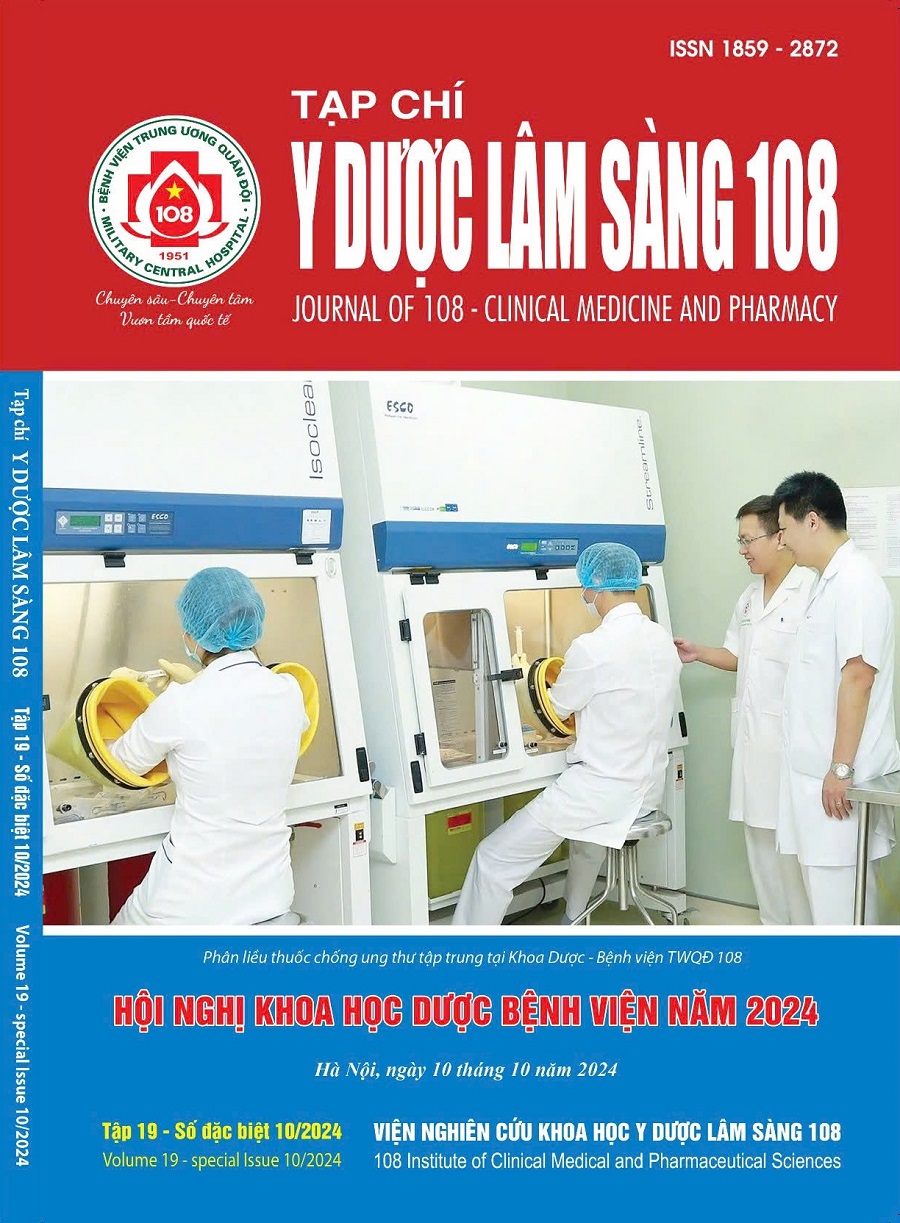Analysis of adverse events in chemotherapy for colorectal cancer patients using active surveillance at 108 Military Central Hospital
Main Article Content
Keywords
Abstract
Objective: To analyze adverse events in chemotherapy for colorectal cancer patients at 108 Military Central Hospital using active surveillance. Subject and method: A cross-sectional study on 195 colorectal cancer patients undergoing chemotherapy who met the inclusion and exclusion criteria. An active surveillance method for adverse drug reactions and the Ministry of Health's guidelines for ADR prevention methods were applied to the study. Result: Of the 195 patients participating in the study, 61% were male. The median age was 61 years, and 87.2% of cancer patients were in stage IV. Regarding digestive adverse events, the rate of diarrhea and mouth ulcers were 6.1% and 9.7%, respectively. After treatment, 61.5% of patients experienced nausea, and 38.5% experienced vomiting. The majority of cases of nausea and vomiting occurred at levels 1 and 2. 95.1% of patients with an average risk level received appropriate vomiting prophylaxis. In terms of hematological events, 38.5% had leukopenia at all levels. Levels 3 and 4 constituted 13.3% of the total. 22.1% of patients recorded thrombocytopenia, predominantly at level 1. 41.1% of patients had anemia, which was also mainly at level 1. Conclusion: Active surveillance of digestive and hematological events in patients has shown more clearly the frequency and severity of events occurring in colorectal cancer patients at 108 Military Central Hospital. Some events need to be further evaluated for risk factors to have appropriate preventive measures.
Article Details
References
2. Bộ Y tế (2019) Hướng dẫn thực hành dược lâm sàng cho dược sĩ trong một số bệnh không lây nhiễm. Chương 4. P. 198 (ban hành theo quyết định 3809/QĐ-BYT ngày 27/8/2019).
3. Bộ Y tế (2022) Hướng dẫn giám sát phản ứng có hại của thuốc tại cơ sở khám bệnh, chữa bệnh. (ban hành theo quyết định 29/QĐ-BYT ngày 5/1/2022).
4. Nguyễn Sơn Nam, Lê Thị Phương Thảo (2018) Đánh giá đặc điểm các biến cố bất lợi của một số phác đồ điều trị ung thư đại trực tràng tại Bệnh viện Trung ương Quân đội 108 giai đoạn 2015 - 2017. Tạp chí Y Dược Lâm sàng 108.
5. DiPiro JT, Yee GC, Haines ST, Nolin TD, Ellingrod VL, Posey L (2022) Pharmacotherapy: A Pathophysiologic Approach, 12th Edition, McGraw Hill, Section 19, Oncologic Disorders.
6. NCCN Clinical Practice Guidelines in Oncology (2024), Colon Cancer, Version 5.2024.
7. Gao A, Zhang L, Zhong D (2023) Chemotherapy-induced thrombocytopenia: Literature review. Discover Oncology 14(1): 10.
8. Slaoui M, Aoullay Z et al (2020) Therapeutic characteristics, chemotherapy-related toxicities and survivorship in colorectal cancer patients. Ethiop J Health Sci 30(1): 65-74.
9. Tsuji Y, Baba H, Takeda K, Kobayashi M, Oki E, Gotoh M, Yoshida K, Shimokawa M, Kakeji Y, Aiba K (2017) Chemotherapy-induced nausea and vomiting (CINV) in 190 colorectal cancer patients: A prospective registration study by the CINV study group of Japan. Expert Opinion on Pharmacotherapy 18(8): 753-758.
 ISSN: 1859 - 2872
ISSN: 1859 - 2872
